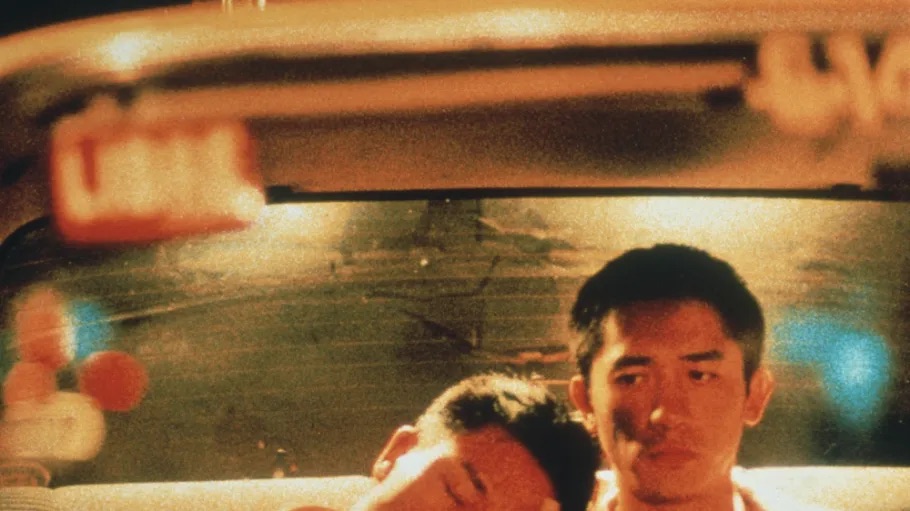My Own Private Idaho is a queer road trip film that tells the story of Mike and Scott, two best friends who are sex workers, living and traveling aimlessly with one another. The development of their relationship with one another and their positions in life throughout the story change in vastly different ways. Elements of their class, ability, and sexuality bring them on radically different journeys, both in space and in relationship to the concept of ‘home’. Likewise, the concept of marginality as an influence on the two main characters, their relationship with one another, and society at large asks us to question traditional notions of what home, happiness, and safety can be. The film is a queer nod to, and diversion from the archetypal American road movie, namely The Wizard of Oz. As we discussed in class, it utilizes traditional symbols from classic road movies like The Wizard of Oz to create an intertextual dialogue that is both a parody and a subversion of the original form.
If My Own Privat Idaho is a parody of Oz, we find our symbolic Dorothy in Mikey’s character: a narcoleptic queer hustler who was abandoned at an early age, is a drug user, and a child of incest. Mikey’s position in relation to others is defined by long-term housing instability, criminality, and the unpredictable seizures caused by his narcolepsy any time he thinks of home. In this way, Mikey is like an inversion of Dorothy. Whereas Dorothy is the symbolic virtuous all-American country girl, Mikey as a queer, traumatized, disabled criminal is positioned marginally in nearly every aspect of his life. Similarly, whereas Dorothy is on a journey trying to return to a stable family and home, Mikey’s visions of home are fraught and destructive, taking him from the “real world” by taking him from consciousness. Several times throughout the film, Mikey’s viewpoint as the focalizer shows images of a small home in the country, not unlike Dorothy’s home, that falls from the sky- crashing to the ground, between snapshots of his mother who abandoned him.
While elements outside of Mikey’s control have always placed him in a marginal position to the norms of society and law, Scott has chosen to live the life of a hustler in order to temporarily escape the restrictions he feels living in a privileged position, especially in terms of his class and sexuality. From early moments in the film, we understand Scott’s marginality to be planned and temporary. We learn that Scott isn’t queer like Mikey, but considers himself only gay-for-pay. Likewise, as he mentions early on, he will eventually return to his rich family and inherit their power and wealth.
However, by the end of the movie when Scott has done just that, it becomes obvious that the home he’s returned to is one whose laws and norms rob him of happiness, individuality, and freedom of expression. The difference in Mikey and Scott’s happiness by the end of the film is most apparent during the scenes where they attend separate funerals side by side. On one hand, Scott and his family are expressionless, silent, grey and still as they lower his father’s coffin into the ground. Across the field, Bob’s funeral has turned into a wild celebration, where his friends lament Bob by dancing and screaming with abandon. It encapsulates what Bell Hooks wrote about marginality as a site of resistance. Despite living outside the law and society’s traditionally accepted norms, without wealth, safety, or the stability of a home, Mikey is in a large sense much freer than Scott could ever be. Scott must perform heterosexual masculinity for the rest of his life, as long as he wants to reap the benefits of his family’s wealth and political power. Whereas Mikey’s story can be seen as one of queer happiness not dispite marginality, but because of it. Likewise, the difference in positional marginality between Mikey and Scott throughout the film reflects an interesting message about the conversations around queer utopias that we have repeatedly touched on in class. While any argument that can be made to Scott’s claim to queerness would be based around a universalizing view, as similarly outlined by Annamarie Jagose in Lesbian Utopics, such a relationship to queerness would be predicated on the space of his queer identity as liberatory concerning established systems of power. However, this argument is difficult to maintain considering the benefits of Scott’s positions both within heterosexual normativity and outside of it, each comes with its own set of caveats. As a ‘queer’ hustler, Scott benefits from the lack of pressure to fulfill restricting heterosexual norms, while he still struggles with the situational marginality of living a taboo, criminalized lifestyle. On the other hand, after Scott resumes his place in the heteronormative societal structure, he loses that degree of freedom queerness gave him, while gaining the material benefits of heterosexuality.
Works Cited:
Hooks, Bell. “Marginality as Site of Resistance.” Feminist Review, vol. 25, no. 1, 1987, pp. 13-31.
Jagose, Annamarie. “Lesbians are Elsewhere.” Lesbian Utopics, eBook, Routledge, 1994, 1-24.
My Own Private Idaho. Directed by Gus Van Sant, New Line Cinema, 1991.

Leave a Reply